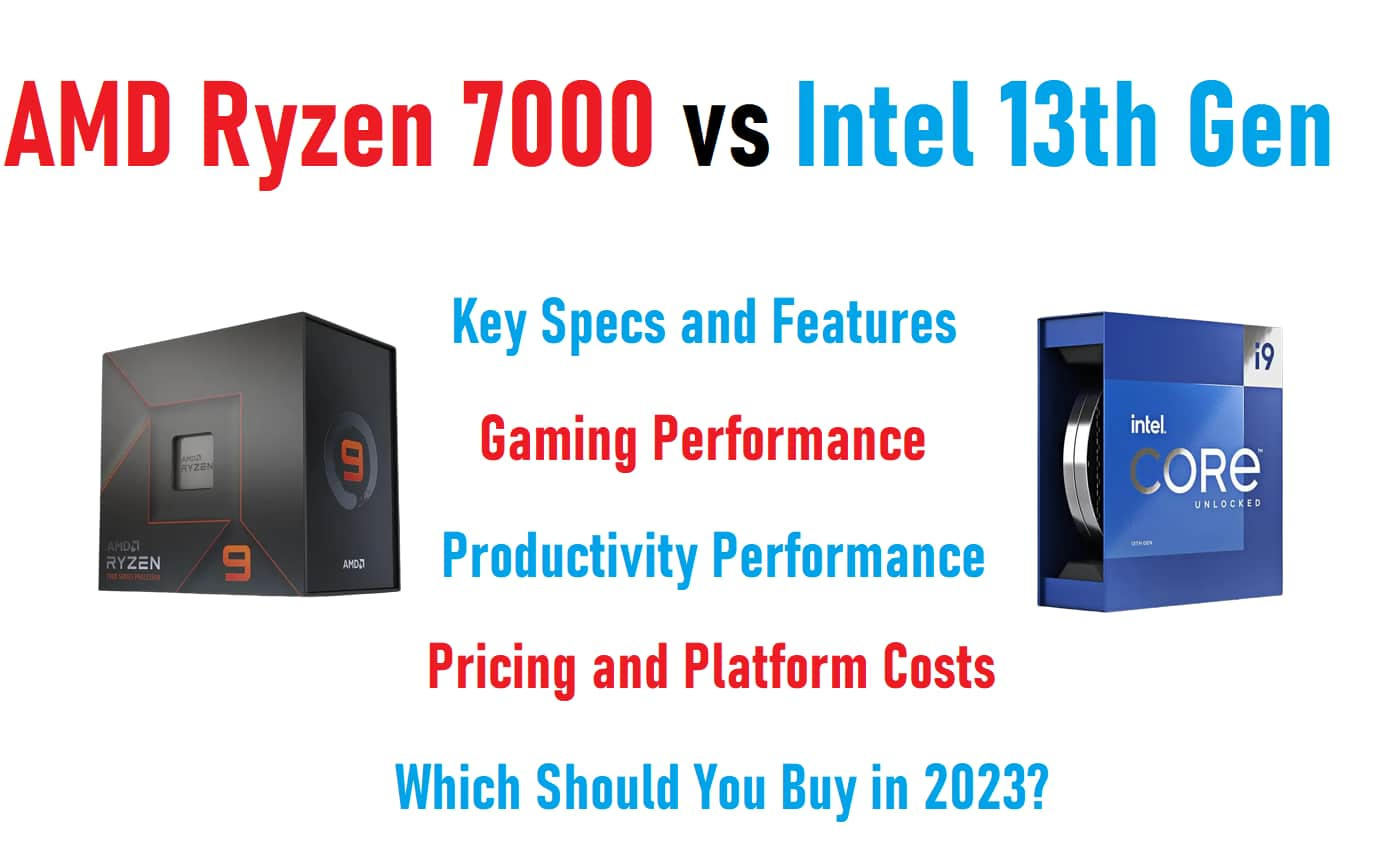AMD and Intel have been locked in an ongoing battle for CPU supremacy. AMD disrupted the market in 2017 with the launch of Ryzen, offering more cores and threads at very competitive prices. Now in 2023, AMD’s Ryzen 7000 chips based on the Zen 4 architecture face off against Intel’s 13th Gen Core processors.
But which CPU family reigns supreme today? Should you buy Ryzen 7000 or Intel 13th Gen for gaming, streaming, and productivity workloads? In this comprehensive guide, we’ll compare all the key features and benchmarks to help you decide.
AMD Ryzen 7000 vs Intel 13th Gen: Key Specs and Features
While both families utilize x86 architecture, the Ryzen 7000 and Intel 13th Gen take vastly different approaches to CPU design:
AMD Ryzen 7000
- Built on 5nm Zen 4 architecture
- Uses chiplet design with 3D V-Cache
- Up to 16 cores / 32 threads
- Supports DDR5 memory
- Requires new AM5 socket motherboards
Intel 13th Gen
- Built on Intel 7 and 10nm process
- Combines Performance cores (P-cores) and Efficient cores (E-cores)
- Up to 24 cores / 32 threads
- Supports DDR4 and DDR5 memory
- Compatible with existing LGA-1700 socket motherboards
Ryzen 7000 chips are manufactured on a denser 5nm process and stack chiplets vertically to achieve greater core density. Meanwhile, Intel combines different core types and leverages mature 10nm production.
Gaming Performance: Ryzen 7000 vs Intel 13th Gen
For gaming specifically, the Ryzen 7000 and Intel 13th Gen deliver extremely close performance:
- At 1080p, the Ryzen 7 7800X3D is roughly 5% faster than the Core i9-13900K on average
- For 1440p and 4K gaming, most CPUs are within 2-3% of each other since games become more GPU limited
- Mid-range Ryzen 5s vs Core i5s are nearly identical in game benchmarks
Based on reviews at sites like Tom’s Hardware, gaming performance is effectively a tie between latest generation AMD and Intel processors.
The extra L3 cache on Ryzen 7000 3D models allows them to slightly outperform Intel flagships like the 13900K. But for most real-world gaming, any current gen CPU will provide excellent frame rates.
Productivity Performance
For multi-threaded workloads like video editing, 3D rendering, code compiling etc., Ryzen 7000 and high-end Intel 13th Gen chips trade blows:
- In Cinebench R23 nT, the 16-core Ryzen 9 7950X beats the 13900K by about 5%
- But the 13900K turns the tables in Blender, leading the 7950X by roughly 3%
- Mid-range hex-core options like Ryzen 5 7600X and Core i5-13600K are again very close
So for productivity, AMD vs Intel comes down to specific software optimization. But both families offer excellent pro-level performance when configured with enough cores, memory, and storage.
Pricing and Platform Costs
The CPU itself is only part of your total platform costs. Here are key pricing considerations:
- Ryzen 7000 requires more expensive AM5 motherboards and DDR5 memory
- Intel 13th Gen supports cheaper DDR4 memory and existing LGA 1700 boards
- For budget builds, older Intel 12th Gen and Ryzen 5000 may provide better value
If maximizing performance for the least cost, opting for Intel 13th Gen with a DDR4 board could save you $100-150 compared to equivalent Ryzen 7000 parts. However, you lose future upgradability.
Which Should You Buy in 2023?
For most gamers and average users, our recommendation is:
- Budget Under $1000 – Get Intel 12th Gen or Ryzen 5000 to maximize your GPU budget
- Performance Gaming – Intel 13th Gen offers marginally better FPS for less cost currently
- Future-Proof Platform – Ryzen 7000 provides more upgradability down the road
- Productivity Workloads – Either AMD or Intel will handle demanding tasks well if spec’d properly
So in summary, Ryzen 7000 and Intel 13th Gen offer nearly equivalent gaming prowess. Intel has a slight edge today in cost-effectiveness. But AMD gives you more longevity if you plan to upgrade your CPU later. Ultimately you can’t go wrong performance-wise with either brand. Pick based on your budget, use case, and preference for AMD or Intel.
Let us know which CPU family you would choose and why in the comments!









